Kia Stonic vs Toyota Aygo – Which model is better for everyday use?
Costs and Efficiency:
Price and efficiency are key factors when choosing a car – and this is often where the real differences emerge.
Toyota Aygo has a noticeable advantage in terms of price – it starts at 15500 £, while the Kia Stonic costs 20100 £. That’s a price difference of around 4629 £.
Fuel consumption also shows a difference: Toyota Aygo manages with 4.80 L and is therefore somewhat more efficient than the Kia Stonic with 5.60 L. The difference is about 0.80 L per 100 km.
Engine and Performance:
Power, torque and acceleration are the classic benchmarks for car enthusiasts – and here, some clear differences start to show.
When it comes to engine power, the Kia Stonic has a distinct edge – offering 115 HP compared to 72 HP. That’s roughly 43 HP more horsepower.
In acceleration from 0 to 100 km/h, the Kia Stonic is significantly quicker – completing the sprint in 10.70 s, while the Toyota Aygo takes 15.50 s. That’s about 4.80 s faster.
In terms of top speed, the Kia Stonic performs somewhat better – reaching 182 km/h, while the Toyota Aygo tops out at 158 km/h. The difference is around 24 km/h.
There’s also a difference in torque: Kia Stonic pulls significantly stronger with 200 Nm compared to 93 Nm. That’s about 107 Nm difference.
Space and Everyday Use:
Cabin size, boot volume and payload all play a role in everyday practicality. Here, comfort and flexibility make the difference.
Seats: Kia Stonic offers a bit more seating capacity – 5 vs 4.
In curb weight, Toyota Aygo is somewhat lighter – 1015 kg compared to 1205 kg. The difference is around 190 kg.
In terms of boot space, the Kia Stonic offers evident more room – 352 L compared to 231 L. That’s a difference of about 121 L.
In maximum load capacity, the Kia Stonic performs distinct better – up to 1155 L, which is about 326 L more than the Toyota Aygo.
When it comes to payload, Kia Stonic noticeable takes the win – 445 kg compared to 345 kg. That’s a difference of about 100 kg.
Who comes out on top?
Overall, the Kia Stonic shows itself to be outperforms in nearly all aspects and secures the title of DriveDuel Champion.
It convinces with the more balanced overall package and proves to be the more versatile choice for everyday use.
Costs and Consumption
View detailed analysis
Engine and Performance
View detailed analysis
Dimensions and Body
View detailed analysis
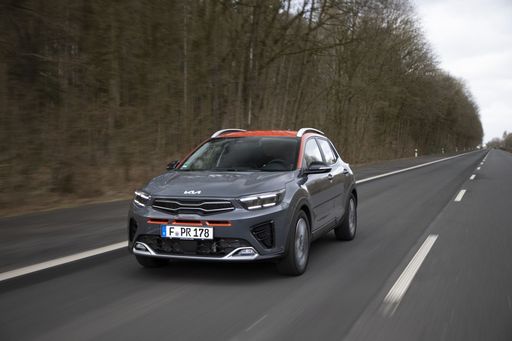 @ Kia Corporation
@ Kia Corporation
Kia Stonic
Kia Stonic
The Kia Stonic is a sprightly compact crossover that mixes city-friendly agility with a cheeky, modern design — perfect for buyers who want style without sacrificing sense. Inside it serves up clever practicality and a bright, well-equipped cabin, making everyday driving feel a bit more fun than it has any right to be.
details @ Kia Corporation
@ Kia Corporation
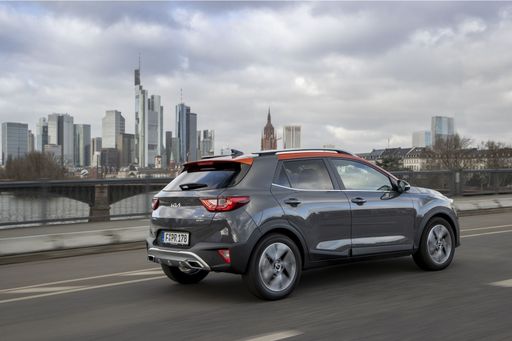 @ Kia Corporation
@ Kia Corporation
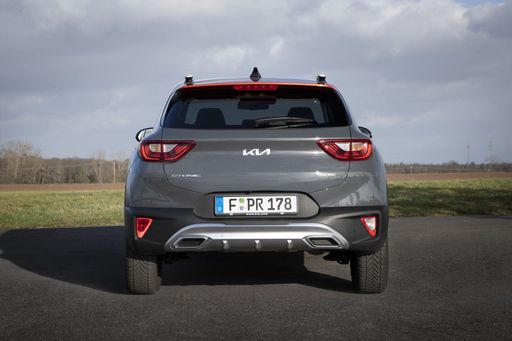 @ Kia Corporation
@ Kia Corporation
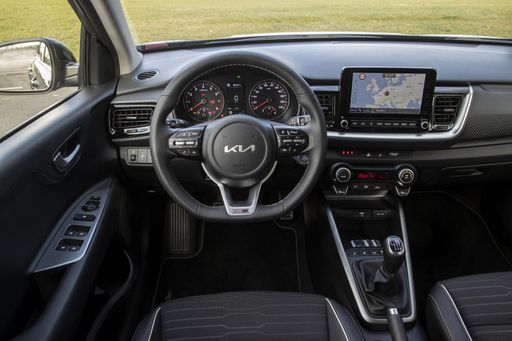 @ Kia Corporation
@ Kia Corporation
 @ Kia Corporation
@ Kia Corporation
Toyota Aygo
The Aygo is a cheeky city car that turns congested streets into a playground, with bold styling and sprightly manners that make parking a pleasure rather than a pain. Economical to run and surprisingly well equipped for its size, the Aygo is a smart choice for urban buyers who want personality without a premium price and a car that brings a smile to the daily commute.
details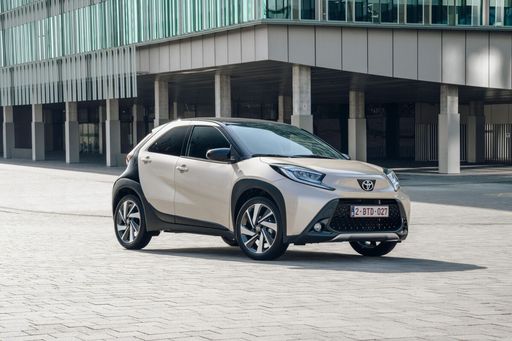 @ Toyota Motor Corporation
@ Toyota Motor Corporation
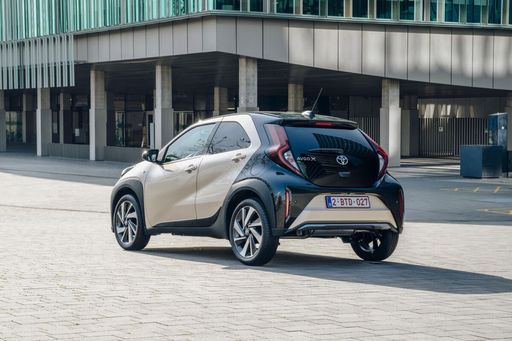 @ Toyota Motor Corporation
@ Toyota Motor Corporation
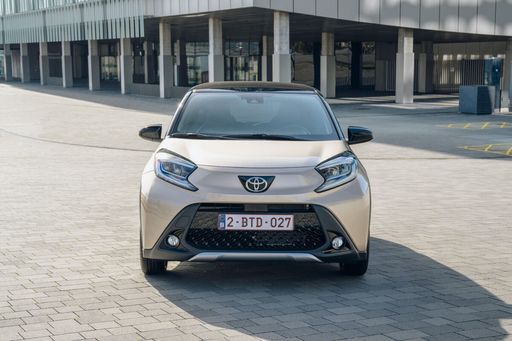 @ Toyota Motor Corporation
@ Toyota Motor Corporation
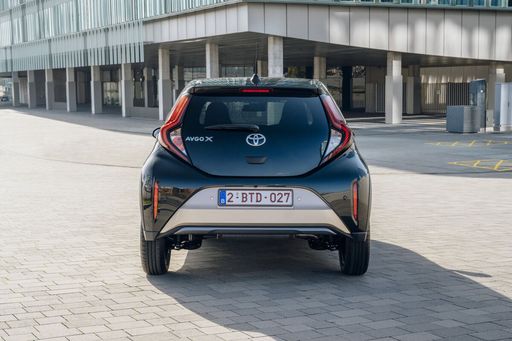 @ Toyota Motor Corporation
@ Toyota Motor Corporation
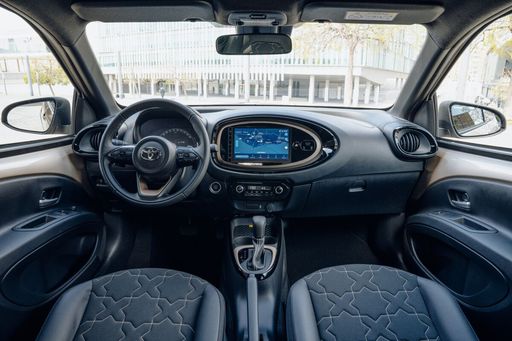 @ Toyota Motor Corporation
@ Toyota Motor Corporation
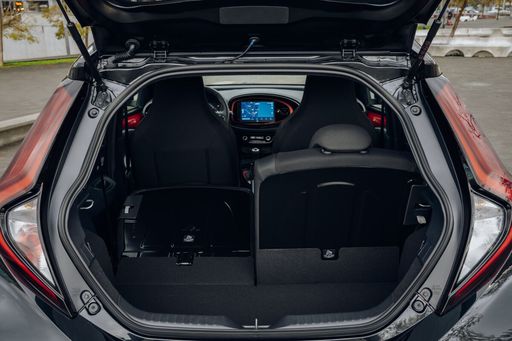 @ Toyota Motor Corporation
@ Toyota Motor Corporation
 @ Kia Corporation
@ Kia Corporation
|
 @ Toyota Motor Corporation
@ Toyota Motor Corporation
|
|
|
|
Costs and Consumption |
|
|---|---|
|
Price
20100 - 26600 £
|
Price
15500 - 22100 £
|
|
Consumption L/100km
5.6 - 5.9 L
|
Consumption L/100km
4.8 - 4.9 L
|
|
Consumption kWh/100km
-
|
Consumption kWh/100km
-
|
|
Electric Range
-
|
Electric Range
-
|
|
Battery Capacity
-
|
Battery Capacity
-
|
|
co2
127 - 133 g/km
|
co2
108 - 111 g/km
|
|
Fuel tank capacity
45 L
|
Fuel tank capacity
35 L
|
Dimensions and Body |
|
|---|---|
|
Body Type
SUV
|
Body Type
SUV
|
|
Seats
5
|
Seats
4
|
|
Doors
5
|
Doors
5
|
|
Curb weight
1205 - 1270 kg
|
Curb weight
1015 kg
|
|
Trunk capacity
352 L
|
Trunk capacity
231 L
|
|
Length
4165 mm
|
Length
3700 mm
|
|
Width
1760 mm
|
Width
1740 mm
|
|
Height
1520 mm
|
Height
1510 mm
|
|
Max trunk capacity
1155 L
|
Max trunk capacity
829 L
|
|
Payload
440 - 445 kg
|
Payload
345 kg
|
Engine and Performance |
|
|---|---|
|
Engine Type
Petrol, Petrol MHEV
|
Engine Type
Petrol
|
|
Transmission
Manuel, Automatic
|
Transmission
Manuel, Automatic
|
|
Transmission Detail
Manual Gearbox, Dual-Clutch Automatic
|
Transmission Detail
Manual Gearbox, CVT
|
|
Drive Type
Front-Wheel Drive
|
Drive Type
Front-Wheel Drive
|
|
Power HP
100 - 115 HP
|
Power HP
72 HP
|
|
Acceleration 0-100km/h
10.7 - 12.1 s
|
Acceleration 0-100km/h
15.5 - 15.6 s
|
|
Max Speed
179 - 182 km/h
|
Max Speed
151 - 158 km/h
|
|
Torque
172 - 200 Nm
|
Torque
93 Nm
|
|
Number of Cylinders
3
|
Number of Cylinders
3
|
|
Power kW
74 - 85 kW
|
Power kW
53 kW
|
|
Engine capacity
998 cm3
|
Engine capacity
998 cm3
|
General |
|
|---|---|
|
Model Year
2025
|
Model Year
2024 - 2025
|
|
CO2 Efficiency Class
D
|
CO2 Efficiency Class
C
|
|
Brand
Kia
|
Brand
Toyota
|
Is the Kia Stonic offered with different drivetrains?
The Kia Stonic is offered with Front-Wheel Drive.
The prices and data displayed are estimates based on German list prices and may vary by country. This information is not legally binding.
